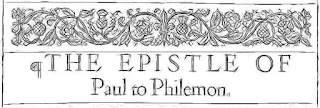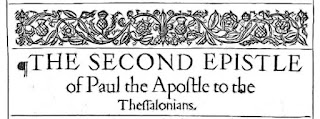Daily Devotion in Philemon

Today’s Nugget: The letter (epistle) to Philemon is an unusual book compared to the other New Testament inclusions. Paul’s personal letter to Philemon, a wealthy man and a laborer for Christ, had church in his own house (Philemon 2). In it, Paul shares his concern to do right and his spirit to reconcile those that have parted ways. Apparently, Onesimus was a runaway slave of Philemon’s. Onesimus ran to Rome, perhaps to hide his identity among the large population. There, the runaway met Paul, who was in prison. How they met in prison is not told. It could be possible that Onesimus was jailed for his running away, and that is how he met Paul. Paul led the man to the Lord (Philemon 10). It was not long until the two became good friends. Onesimus was a blessing to the now elderly, cold, imprisoned preacher. Paul had a great need for Onesimus, but something was more important than the prisoner's comfort; it was doing the right thing. For this reason, Paul wrote the letter to Philemo












